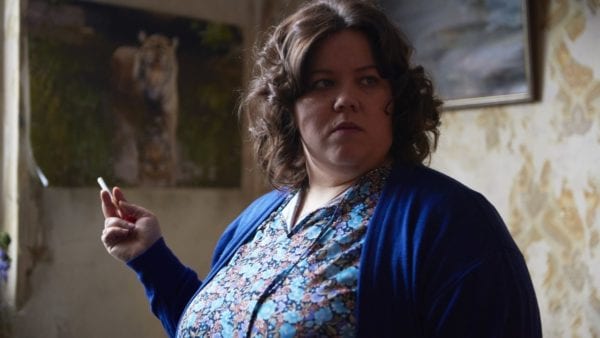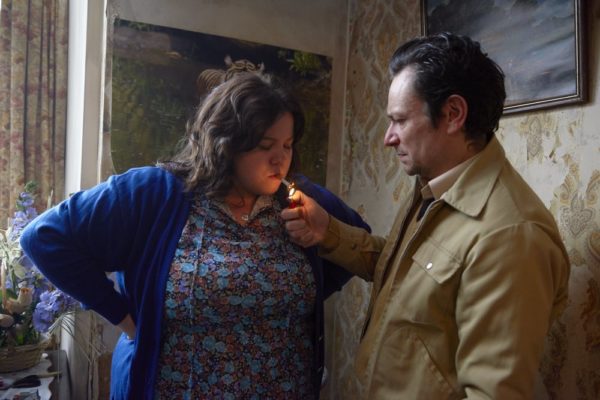Tom Beasley talks to actor Justin Salinger about his role as half of the titular couple in Richard Billingham’s British drama Ray & Liz…
Arriving in UK cinemas this weekend in a cloud of acrid cigarette smoke, Richard Billingham’s Ray & Liz stands out from the pack. Billingham’s debut feature sees him directing a vision of his own childhood, with Ella Smith and Justin Salinger portraying his parents, living in the Black Country during Thatcher’s 80s. Flickering Myth got chance to sit down with Salinger to discuss his performance as Ray and his take on the movie’s unique time capsule qualities…
With these British independent films, it can often be quite a wait before they get seen by an audience, after the festival circuit and that stuff. Are you excited that the general public will now finally get to see it?
Yeah, I’m very excited. It feels like such a long time ago. I think we filmed it about two years ago, so it’s very exciting that it’s all coming to a head now. I went to the Locarno Festival and Toronto and it was great to get feedback on what people thought of the film. It feels like it has been a long time in the making.
One of the things that interests me is that you have these films where the promotional trail goes on far longer than actually shooting it…
I think it was only a three week shoot for us and we joined the process very late on. It feels like [producer] Jacqui Davies and Richard have been 10 years in the making, from first conversations through to actually filming and then to this point. We came on right at the last minute and filmed for three weeks. You sort of forget about it and there’s a period where it just goes away and you get on with your life. Two years pass and then it all resurfaces and you find yourself trying to remember a lot of what happened and the process you went through.
I’m interested to get your take on what it’s like to play a character when you have so much material, as well as Richard himself being there?
When I came to the part of Ray, I was playing catch-up a bit. I think I remembered the photographs from the 80s and there was a bell ringing in my distant memory. We had a very short period of time in which to get up to speed. I remember filming a self-tape on my mobile phone to submit and you’ve got literally just a day or so to prepare your audition and then they see something in you that interests them. So you go in maybe two days later and you’ve got that long to brush up, look at some pictures and watch whatever you can before you have to try to capture something or recreate something that will resonate with Richard. You never know if that’s going to happen.
Obviously, when you get the part, you realise something you’ve done with instinct has resonated or worked for him. Then the work begins. But, of course, it was very frustrating because I realised that after I had been cast, there was only a week and a half or two weeks before we headed up to Birmingham to shoot. I think we got something like three hours of rehearsal with Richard. I watched the documentary and looked at all of the pictures, but put most of my focus on the script because it was clear they were real memories and real events that we were reading. I think you heavily rely on your instincts when you read that script.
That’s all you’ve got really. I did walk around with Ray’s voice plugged into my ears from my iPhone, hoping that something would rub off. But it is ultimately rather frustrating in a process like this because time is so short. You’d obviously like to spend time talking to Richard and reading books, but it’s so short, so you end up relying on instincts and hoping you can build upon the thing you did in your first audition.
It’s daunting and really terrifying, having to perform someobody’s father for them. Obviously, the scope for getting it wrong is huge. Ultimately, I would ask Richard if I was doing it wrong. He’s brilliant. He very clearly and precisely would set you back on the right path with all of the elements of the puzzle.
I wanted to ask what Richard was like on set, given he’s filming his own life. Was it a case of “no, this isn’t right” or was he allowing you to go your own way?
It was quite mysterious. I wasn’t sure. He tended to be on the back foot and let you got in with it, so you thought you must be doing something right. Then, suddenly, he’d come in with quite a strong, defining note. Often for me, which was incredibly helpful, it would be about the physicality of his father. You’d go for a couple of days and there’d be no notes and you’d think you’d got it, then he’d say something like “my father would never sit like that” and he’d sort of rearrange you physically. You’d be working from the outside in. After he’d rearranged you, you’d feel a lot closer to the character and very reassured that you were doing something right.
I remember once walking into the kitchen to spit out chilli into the sink and he remembered the physicality of this man and how he wasn’t comfortable in his body. He asked me to do it again and play the age and play the man’s body. He gave great notes like that which would send you massively in the right direction, but generally he wouldn’t be controlling to a point which would stifle a performance.
I wanted to ask about the accent, because I’m from the West Midlands. It was truly fascinating for me because it’s not very often you hear those accents when you’re watching a film. You mentioned listening to recordings, but I’d love to ask how you found the accent and how important that was in building the character?
I think, for me, it’s really important and really key. You feel like you have the responsibility to get stuff correct, but again you have the time pressure. Ideally, I would have loved six months. I’m the kind of person who would’ve loved that time to sit and listen and have a dialect coach and do all of that extensive work, talking in that accent every day. But of course you don’t have that luxury. So I apologise if it sounds terrible and to the people from West Midlands.
That’s what I’m constantly thinking whenever I do an accent – that it’s not authentic. This film is so much about authenticity and it’s so brutally real. The responsiblity is huge to get something right and I gave it everything I’ve got. That voice was in my ear in between takes and when I first woke up in the morning or fell asleep at night. In the end, you give it your best shot and hope you’ve captured a flavour. Richard never mentioned that the accent wasn’t good, so that was very supportive in a way. He didn’t put it high on his list of priorities, so it didn’t feel that pressurised, though I did put the pressure on myself.
Click below to continue onto the second page…















